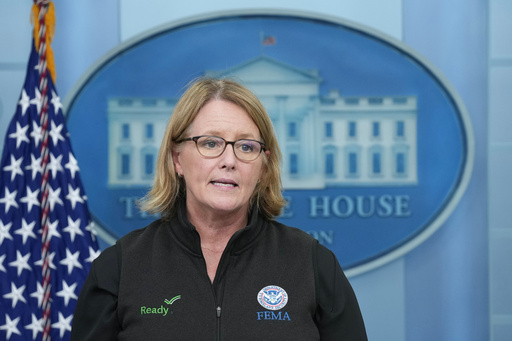
WASHINGTON — During a session with lawmakers on Tuesday, the administrator of the Federal Emergency Management Agency (FEMA) indicated that she has urged the agency’s inspector general to investigate whether an employee acted independently when instructing colleagues to refrain from visiting homes displaying signs in support of President-elect Donald Trump.
FEMA Administrator Deanne Criswell explained that a significant responsibility of the agency is to conduct door-to-door outreach to ensure survivors are informed about the federal resources available to them. According to her statements, the employee in question had sent communications to approximately 11 subordinates, advising them to “avoid homes advertising Trump.”
Criswell mentioned that her senior leadership team has provided her with information that has led them to recommend the termination of the employee, a decision with which she agreed.
“I do not believe that this employee’s actions reflect any widespread cultural issues within FEMA,” Criswell remarked. Nevertheless, she expressed her support for an independent probe into the situation.
“The inspector general has not yet confirmed their intent to investigate, but I strongly encourage them to look into whether this was an isolated incident or indicative of a broader problem,” Criswell stated.
Criswell’s testimony came before a House subcommittee looking into the federal response to the recent Hurricanes Helene and Milton. This hearing took place a day after President Joe Biden requested approximately $100 billion in emergency disaster funding, of which about $40 billion is earmarked for FEMA initiatives.
While lawmakers aimed to scrutinize the overall response from FEMA regarding the catastrophic storms, there was a noticeable focus on allegations that assistance may have been denied to individuals based on their political affiliations.
Rep. Scott Perry, R-Pa., acknowledged the expediency of the employee’s termination but noted from an interview with her that she seemed to think she was following directives from the agency.
“It appears this particular employee feels she is being scapegoated, and if so, then others at FEMA must be held accountable,” said Perry, who chairs the panel responsible for the hearing on Tuesday.
Criswell affirmed her commitment to preventing the recurrence of such incidents, revealing that a different team had been dispatched to reach out to all homes that had been overlooked due to the employee’s guidance.
Rep. Chuck Edwards, R-N.C., representing a district heavily impacted by Hurricane Helene, suggested that the agency’s response could be somewhat disorganized given that mountains often experience atypical flooding. Nonetheless, he outlined significant operational failures. He pointed out that by the time the storm subsided on September 27, around one million residents were without electricity, and 25 water systems had been compromised. Yet, he criticized FEMA for taking three days to provide any substantial acknowledgment of the situation.
“For FEMA to wait three days before producing any visibility is simply unacceptable,” Edwards stated. “There were people stranded in their homes, lacking not just power but also basic sanitation and drinking water. We were cut off from the rest of the world.”
In response, Criswell emphasized that FEMA was active on the ground even before the hurricanes made landfall and expressed pride in the efforts of around 22,000 workers across six states. She acknowledged the challenges faced due to the storms and the proliferation of misinformation on social media.
“We assist all survivors in obtaining every bit of aid they are legally entitled to, and such misinformation complicates our efforts significantly,” she concluded.
